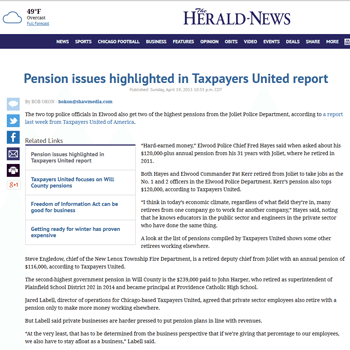View as PDF Rock Island, IL – Taxpayers United of America (TUA) has released its most recent government pension study exposing individual pensions for Rock Island municipal, Moline Municipal, East Moline Municipal, Rock Island County, Rock Island County government schools, and Black Hawk College.
“These government pensions explain why bureaucrats in Rock Island County keep trying to pass a new sales tax,” stated TUA’s director of operations, Jared Labell.
“There are about 930 Rock Island County government teachers collecting pensions of at least $50,000 annually. The median household income across the county is only $48,702 and the poverty rate is 13.3%.”
“Across 5 state pension funds, there are more than 12,154 government pensioners collecting six-figure pensions and over 85,893 pensioners collecting more than $50,000 where the state debt per capita is $24,959.”
“On average, these government pensioners contribute only about 5.5% to their own retirement payout. Taxpayers are forced to contribute $4 for every $1 that the government employees pay toward their own retirement. In the private sector, employees pay 15% of every dollar they earn into Social Security for an average pension of only $15,000!”
“These government bureaucrats need to get the message that taxpayers have had enough and it’s time to cut spending. Three times in the last six years Rock Island County has tried to pass a 1% sales tax and three times the voters have defeated this destructive new tax.”
The Rock Island Police pension fund is only funded at about 38.8%. A healthy funding level is at least 85%. In 2003, 18% of Moline’s property tax levy went to the police and fire pensions, in 2014, it was about 47%, according to Kathy Carr, the city’s finance director.
“Taxpayers are on the hook for every penny of the shortfall in pension funding. Forcing taxpayers to pay such a heavy portion of someone else’s retirement is criminal. ”
“It is time to protect the future of taxpayers who have been scammed by politicians and government union thugs into going along with a system that creates and constitutionally protects a special class of government elite.”
“It’s also time for union leadership to have a frank discussion with the rank and file, educating them on the inevitable collapse of an unsustainable crony system designed to siphon money from taxpayers for the benefit of the few. The unions should use those dues forced from members to bail out the pension system rather than use those funds to elect political cronies who keep them in power.”
“Take a look at Calvin D. Lee who retired from Moline USD 40. He gets $197,826 in annual pension payments. Retiring at only 58, his taxpayer funded pension payout will accumulate to more than $7.2 million! And his personal investment in that payout? A mere 5.4%.”
“Then there is Michael T. Huff, retired from Rock Island County government. He gets $97,291 in annual pension payments and because he retired at only 54, those payments with compounded annual cost of living adjustments will accumulate to $4.1 million! His personal investment was only about 2.3% or $94,478, less than his current annual pension.”
The complete list of the following can be at taxpayersunited.org:
- Rock Island County Government
- Rock Island County Government Schools
- Rock Island Municipal Government
- Moline Municipal Government
- East Moline Municipal Government
- Black Hawk College
- Rock Island Police
- Rock Island Fire
- Moline Police
- Moline Fire
“This government pension system is the single cause of Illinois’ critical financial situation and it is mathematically impossible to tax our way out of this situation. 80% of local taxes go to fund government employee pay, pensions, and benefits.”
“The Illinois government has failed us; local governments have failed us. It is in everyone’s best interest to solve the pension problem before the system completely collapses. It is no longer a matter of ‘if’ it will collapse, but when.”
“Our solution is to immediately place all new hires into 401(k) style retirement savings accounts, increase member contributions to their retirement fund, increase retirement age for full benefits, and increase member contributions to 50% of health care premiums. Anything short of these reforms will do nothing to permanently solve the problem. If it takes a Constitutional Amendment, then we need to get that on the ballot as soon as possible!”






